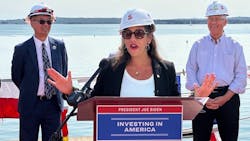FTA awards $300 million in grants to modernize America’s ferry systems
Grants totaling nearly $300 million were awarded by the U.S. Department of Transportation’s Federal Transit Administration (USDOT FTA) to expand and modernize the nation's ferry systems. This investment will go towards supporting the movement of people and goods, boosting local economies and helping to lower costs for families and providing connections for Americans who, in some cases, have no other alternative travel options.
"Ferries serve Americans who depend heavily on this form of transit because of where they live—and the Biden-Harris Administration is making sure people have access to more reliable, cleaner ferry service," said U.S. Transportation Secretary Pete Buttigieg. "These funds will make it easier for Americans to move about their day while also protecting the rivers and waterways they depend on economically."
In total, FTA is awarding 18 grants to projects in 14 states. Federal funding will support projects such as replacing old vessels with electric ships that reduce greenhouse gas pollution and improve air quality, expanding fleets and building new terminals and docks. Of the 18 projects, eight are receiving federal support for environmentally friendly propulsion technologies, such as electric ferries and charging equipment.
FTA's ferry programs invest in improving ferry service in urban and rural communities by providing federal support to acquire modern, greener ferry boats and upgrading equipment to support high-quality, low-emission ferry service.
"This historic funding for FTA's ferry programs will enhance ways for people to travel by water," said FTA Acting Administrator Veronica Vanterpool. "We applaud ferry agencies for taking the big step toward electrification, increasing reliability and bringing their aging ferry systems into a state of good repair."
Funding for these ferry service improvement projects will be sourced through three FTA competitive grant programs to boost ferry service in rural areas, modernize urban ferry systems and lower emissions by speeding up the adoption of low- and zero-emission technology.
These programs are:
- FTA's Ferry Service for Rural Communities Program provides competitive funding to states for ferry service in rural areas. The FTA is awarding $194 million to four projects in two states.
- FTA's Passenger Ferry Grant Program supports capital projects to establish new ferry service and repair and modernize ferry vessels, terminals and facilities in urban areas. The FTA is awarding $56.3 million to eight projects in seven states.
- FTA's Electric or Low Emitting Ferry Program supports the purchase of electric or low-emitting ferry vessels that reduce emissions by using alternative fuels or on-board energy storage systems. FTA is awarding $49 million to six projects in five states.
The selected Fiscal Year 2024 ferry projects include:
- The Alaska Department of Transportation and Public Facilities will receive $106.4 million to build a new ferry to replace a 60-year-old vessel. The new ferry, which will feature a diesel-electric propulsion system, will serve rural southwest Alaska, improving service, reducing greenhouse gas emissions and preserving a vital transit lifeline.
- The San Francisco Bay Area Water Emergency Transportation Authority will receive $11.5 million to build two new electric ferries to support the agency's emission free ferry service between downtown San Francisco, Treasure Island and Mission Bay. The project will reduce congestion and provide fast, clean and reliable ferry transit service to growing neighborhoods with limited street access.
- The Maine Department of Transportation will receive approximately $16.6 million to modernize rural ferry terminals in Lincolnville and Islesboro in northeast Maine that were built in 1959. The project will improve safety and state of good repair and support the future operation of a new hybrid ferry that will service these two communities.
Projects were selected for funding based on criteria in the Notice of Funding Opportunity. FTA received 43 eligible project proposals totaling $638.7 million in requests.
